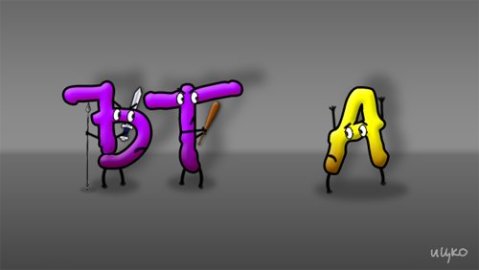The Definite Articles of Bulgarian
06.06.2012 § 9 Comments

Image source: Icko (http://grasshopper.xroads-bg.com/open.php?id=21)
Never mind five names for “uncle”, the definite article in Bulgarian is a truly cross-eye-inducing grammar nugget.
The definite article in English is easy: “the“. That’s it. The tub, the king’s wizards, the pretty pony. Not so in Bulgarian.
First off, the definite article is a suffix in Bulgarian, not a separate word. The definitive of “жена” (“woman”) is “жената“.
However, because it’s a word suffix, the definite article is also affected by the gender and ending of the word, and is different for different ones.
- Feminine nouns that end in consonants: -та (e.g. blood: кръв -> кръвта)
- Nouns that end in -а or -я: -та (e.g. woman: женá -> женáта)
- Nouns that end in -е or -о: -то (e.g. sky: небé -> небéто)
- Masculine nouns that end in consonants: -ът if defining the subject of an action and -а otherwise (e.g. man: мъж -> мъжът)
- Plural nouns ending in -a or -я: -та (e.g. fields: полéта -> полéтата)
- All other plural nouns: -те (e.g. cities: градовé -> градовéте)
Rule #4 needs a bit more explanation. For masculine nouns, the suffix -ът is only used if the noun is the grammatical subject of the clause. In all other cases (object, indirect object, etc.) -a is used.
Example: In the sentence “The man ate the bagel”, “man” is the subject and “bagel” is the object, meaning that the word for “man” (мъж) would be defined with -ът, while the word for “bagel” (геврек) would be defined with -а: Мъжът изяде геврека.
Unfortunately, there are exceptions to rule 4. Fortunately, they are well-defined and easy to remember. There are ten masculine nouns that do not use the suffixes -ът and -а. Instead, they use -ят and -я. These words are:
- цар (tzar)
- ден (day)
- зет (son-in-law)
- път (road)
- кон (horse)
- сън (sleep)
- крал (king)
- лакът (elbow)
- нокът (nail/talon)
- огън (fire)
Cross-eyed yet? We’re almost done.
What happens if you try to define an adjective-noun pair?
In that case the suffix is added to the first adjective and not to the noun, and the following suffixes are used:
- –ят and –я for masculine gender (E.g. “the good man ate the nice bagel”: добрият мъж изяде хубавия геврек)
- –та for feminine gender (E.g. “the good book”: добрáта книга)
- –то for neuter gender (E.g. “the good child”: добрóто дете)
- –те for plural (E.g. “the good people”: добрите хора)
*This post is dedicated to italkyoutalklanguages, a translator living in Japan who’s taking her first steps learning Bulgarian while writing a fun and insightful language blog that you should definitely go and check out!*
I thought that Romanian (my mother tongue) was the only language in which the definite article is a suffix. It’s fascinating that neighboring Bulgarian, although unrelated, also has this oddity…
Great Post , I actually found it useful where you stated that because it’s a word suffix, the definite article is also affected by the gender and ending of the word, and is different for different ones
Your style is unique in comparison to other folks I’ve read stuff from. Thank you for posting when you’ve got the opportunity, Guess
I will just bookmark this web site.
Thanks so much for this useful post! As a Bulgarian of mixed heritage who grew up in the US and who is now preparing to take an exam in Bulgarian language and literature, I find the way you’ve presented the information very concise and comprehensible!
You mean when instead of pronouncing двадесет и пет (25) as “dvadeset i pet” you get more like “dvice-pet”. Yep…
Reblogged this on i talk you talk…languages and commented:
From Blazing Bulgaria – an insightful blog about Bulgaria, its culture and language!
Thanks for the dedication! This is the easiest explanation I have seen of the definite article so far – you should write a textbook. One question about the masculine suffix – is the final ‘T’ pronounced? Some speakers on the CD I have seem to gloss over the sound!
Great question! You’re right, actually, the final ‘T’s are often not pronounced. The difference is largely orthographical.
Wait till we get to numbers 😛 There’s a whole lot of slurring and swallowing letters going on.
Thanks! Yeah, I wondered about the numbers – I couldn’t hear the endings on some of them, but thought that was just me!